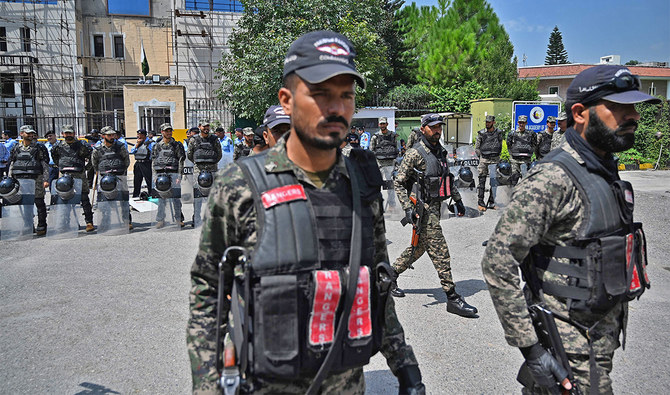ISLAMABAD: The Election Commission of Pakistan (ECP) said on Tuesday the political party of Pakistan’s ex-premier Imran Khan had received “prohibited funds” as it announced a unanimous verdict in a years-long investigation into the funding sources of the entity.
The ECP inquiry has acquired ever greater importance in recent weeks as Khan, who lost office in April in a parliamentary vote of no-confidence, pushes for a political comeback. The closely-watched case was filed by a former member of the PTI party, Akbar S. Babar, in 2014, who alleged that the political entity received foreign funds from individual or companies to support election campaigns, which is prohibited under Pakistani laws.
In its 70-page verdict, which was unanimous, the ECP listed all individuals and entities, including the disgraced business tycoon Arif Naqvi, who sent the prohibited funds, saying Khan’s party “knowingly and willfully received these donations.”
“The commission is satisfied that the contributions and donations have been received by the respondent party through prohibited sources,” the polls regulator ruled.
Reacting to the development, Prime Minister Shehbaz Sharif said Khan had violated the constitution of the country.
“ECP verdict on PTI foreign funding case chargesheets Imran [Khan] Niazi for violating the constitution, submitting false affidavits & accepting foreign money,” he said in a Twitter post. “Proven yet again that he is a certified liar. Nation should ponder over the implications of his politics funded by foreigners.”
The commission found that donations were received from America, Australia, Canada and the UAE, with the PTI getting funds from 34 individuals and 351 businesses, including companies.
Thirteen unknown accounts have also been unearthed, the commission said in the verdict, saying these “disowned” accounts were opened and operated by senior PTI management and leadership.
“Non-disclosure and concealment of 16 bank accounts by PTI which is a serious reporting lapse at the part of PTI leadership and in violation of Article 17 (3) of the constitution of Pakistan,” it said.
According to Article 17 (3) of the constitution, “every political party shall account for the source of its funds in accordance with law.”
Speaking to Arab News, Justice (r) Shaiq Usmani said it was up to the federal government if it wanted to declare the PTI a party that “has been operating in a manner prejudicial to the sovereignty or integrity of Pakistan.”
He added if the government made such declaration, it would be required to refer the matter to the Supreme Court within 15 days “whose decision on the reference will be final.”
“The Supreme Court may ban the party if the PTI fails to justify in response to the show-cause notice that it received all the funding from legal sources,” he said. “But disqualification of Imran Khan from holding any public office on the basis of the election commission’s judgment is out of the question.”
The ECP mentioned, however, that Khan had been providing inaccurate financial information to the election regulatory authorities for years.
“The Chairman of PTI [Imran Khan] for financial year 2008-09 to 2012-13 (Five Years) has submitted Form-I which were found to be grossly inaccurate on the basis of the financial statements obtained by this Commission from SBP [State Bank of Pakistan] and other material available on record,” said the ruling.
“Therefore, in view of the material available on the record and above discussion, the matter falls within the ambit of Article-6 (3) of PPO [Political Parties Ordinance], 2002,” it added.
“Hence, the Commission directs that a notice may be issued to the Respondent party in terms of Rule-6 of PPO 2002, as to why the aforementioned prohibited funds may not be confiscated.”
Barrister Saad Rasool said banning the PTI as a party along with Khan’s disqualification on the basis of the election commission’s judgment was “not possible,” though he added it could still provide the ruling coalition space to launch a political onslaught Khan and his party colleagues.
“The election commission can confiscate the prohibited funding and may impose some further damages on the party as well as a penalty, but nothing more than this under the law is possible,” he told Arab News.
However, former attorney-general of Pakistan Irfan Qadir said the ECP judgment could have “serious consequences” for PTI leadership.
“The PTI should sit with other political parties to bring unanimous reforms to the election laws,” he told Arab News. “Otherwise, this circus will continue in the country.”
“Let’s see how the federal government react to this verdict,” he added.
Federal information minister Marriyum Aurangzeb said Khan was no longer “truthful and honest” and should immediately step down as party chairman.
“The federal government will act upon the election commission’s verdict as per the law,” she added.
Addressing the media in front of the ECP office in Islamabad, PTI leader Farrukh Habib said his party had already expressed reservations regarding the country’s election regulatory authority.
“We have challenged eight different decisions given by the ECP in different high courts and were later given relief in those cases,” he added.
PTI leader, Chaudhry Fawad Hussain, said it was time for fresh elections in the country, calling the ECP decision a “distraction” from real issues.
“PTI is the only Pakistani political party that relies on proper public funding,” he said, adding that much of the money that came into the party accounts was donated by overseas Pakistanis.
“We consider Pakistani nations abroad to be the backbone of the country’s economy,” Hussain said. “Let me make it clear that we will continue to rely on them for our funding in the future.”
The PTI chairman has frequently said the chief election commissioner (CEC), Sikandar Sultan Raja, is not neutral and accused him of taking politically motivated action against the PTI. He has demanded fresh elections should be held under a new CEC.
Addressing the national council meeting of his party in the federal capital on Monday, Khan asked PTI workers and supporters to protest outside the ECP building on August 4 to demand the CEC’s resignation.











